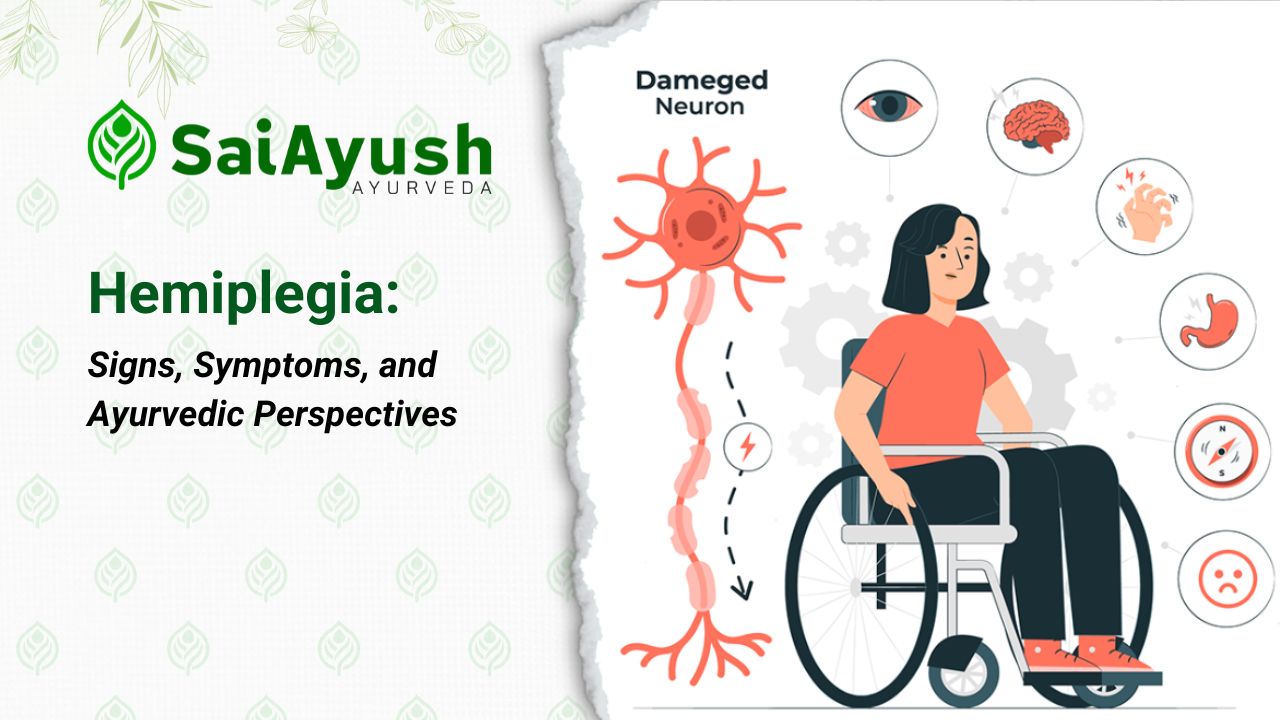Introduction
Hey there! If you’ve stumbled upon this blog, chances are you’re curious about hemiplegia, its signs and symptoms, and how Ayurveda offers a holistic approach to managing this condition. I’m here to guide you through this journey, providing valuable insights and practical tips. Let’s dive in!
What is Hemiplegia?
Hemiplegia is a condition characterized by paralysis on one side of the body. It’s often caused by brain injuries, strokes, or other neurological conditions. Imagine waking up one day and finding that one side of your body doesn’t respond the way it used to. Scary, right? But don’t worry, understanding the condition is the first step toward managing it effectively.
Signs and Symptoms of Hemiplegia
Recognizing the signs and symptoms of hemiplegia early can make a significant difference in treatment outcomes. Here’s what to look out for:
- Sudden Weakness or Paralysis
One of the most noticeable signs of hemiplegia is sudden weakness or paralysis on one side of the body. This can affect the arm, leg, and facial muscles.
- Difficulty in Coordination and Balance
People with hemiplegia often experience problems with coordination and balance. This can make everyday activities like walking or even standing a challenge.
- Speech Difficulties
Speech can be affected due to the paralysis of muscles involved in speaking. This condition, known as aphasia, can make communication difficult.
- Cognitive and Emotional Changes
Hemiplegia can also lead to cognitive and emotional changes. These may include memory issues, difficulty concentrating, and mood swings.
Hemiplegia: An Ayurvedic Perspective
Ayurveda, the ancient Indian system of medicine, offers a unique perspective on hemiplegia. According to Ayurveda, hemiplegia is often linked to an imbalance in the body’s doshas, particularly Vata dosha.
Imbalance in Vata Dosha
Vata dosha governs movement and coordination in the body. An imbalance can lead to conditions like hemiplegia. Ayurveda aims to restore this balance through various treatments and lifestyle modifications.
Ayurvedic Treatments for Hemiplegia
Ayurveda offers a comprehensive approach to treating hemiplegia, focusing on both internal and external treatments. Let’s explore these in detail:
Internal Treatments
Herbal Remedies
Ayurveda uses a variety of herbs to manage hemiplegia. Some commonly used herbs include Ashwagandha, Brahmi, and Guggulu. These herbs help in strengthening the nervous system and improving overall vitality.
Dietary Modifications
A balanced diet that pacifies Vata dosha is crucial. Incorporate warm, nourishing foods like soups, stews, and ghee. Avoid cold and raw foods as they can aggravate Vata.
External Treatments
Panchakarma Therapy
Panchakarma is a detoxification procedure that helps in removing toxins from the body. It includes treatments like Abhyanga (oil massage), Swedana (steam therapy), and Basti (medicated enema).
Physical Therapies
Regular physical therapies such as yoga, specific exercises, and physiotherapy are recommended to improve mobility and strength.
Preventive Measures for Hemiplegia
Preventing hemiplegia involves adopting a healthy lifestyle that maintains the balance of doshas and promotes overall well-being. Here are some tips:
- Maintain a Balanced Diet
Eating a balanced diet rich in nutrients helps in maintaining overall health and preventing dosha imbalances.
- Regular Exercise
Engage in regular physical activity. Yoga and other exercises that enhance flexibility and strength are particularly beneficial.
- Stress Management
Practice stress management techniques like meditation and deep breathing exercises to keep your mind and body relaxed.
- Regular Health Check-ups
Regular check-ups can help in early detection of conditions that might lead to hemiplegia, such as high blood pressure or diabetes.
Conclusion
Understanding hemiplegia and exploring Ayurvedic treatments can offer hope and a holistic path to managing this condition. Remember, a balanced lifestyle, regular exercise, and stress management are key to maintaining health and preventing conditions like hemiplegia.
Stay healthy, stay informed, and embrace the journey of wellness with Ayurveda!
FAQs:
Q1:What is hemiplegia and what causes it?
A1: Hemiplegia is a condition characterized by paralysis on one side of the body, often caused by brain injuries, strokes, or other neurological conditions.
Q2:What are the signs and symptoms of hemiplegia?
A2: Signs and symptoms include sudden weakness or paralysis on one side of the body, difficulty in coordination and balance, speech difficulties, and cognitive and emotional changes.
Q3:How does Ayurveda view hemiplegia?
A3: Ayurveda links hemiplegia to an imbalance in the Vata dosha and offers treatments aimed at restoring this balance through herbal remedies, dietary modifications, and therapies like Panchakarma.
Q4:What are the Ayurvedic treatments for hemiplegia?
A4: Ayurvedic treatments include internal remedies like herbal medications and dietary changes, as well as external treatments such as Panchakarma therapy and physical therapies like yoga and physiotherapy.
Q5:How can hemiplegia be prevented?
A5: Preventive measures include maintaining a balanced diet, engaging in regular exercise, managing stress, and going for regular health check-ups to detect and manage potential risk factors early.
Stay informed and take proactive steps to manage and prevent hemiplegia with the wisdom of Ayurveda!
Discover the healing power of Ayurveda with our latest article at Sai Ayush Ayurveda Hospitals! Dive into the age-old wisdom that can rejuvenate your body and mind. Click here to read more:



0 Comments